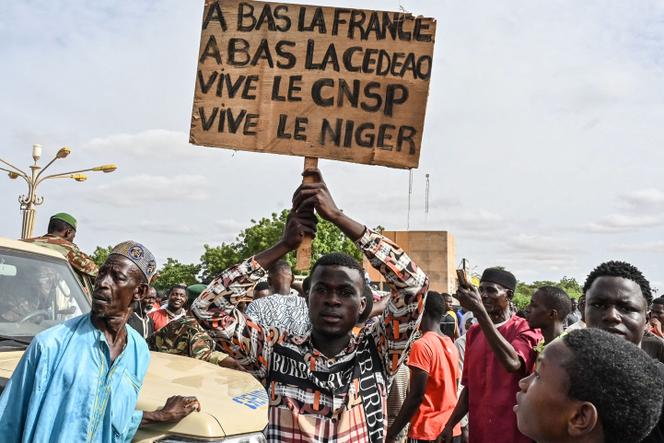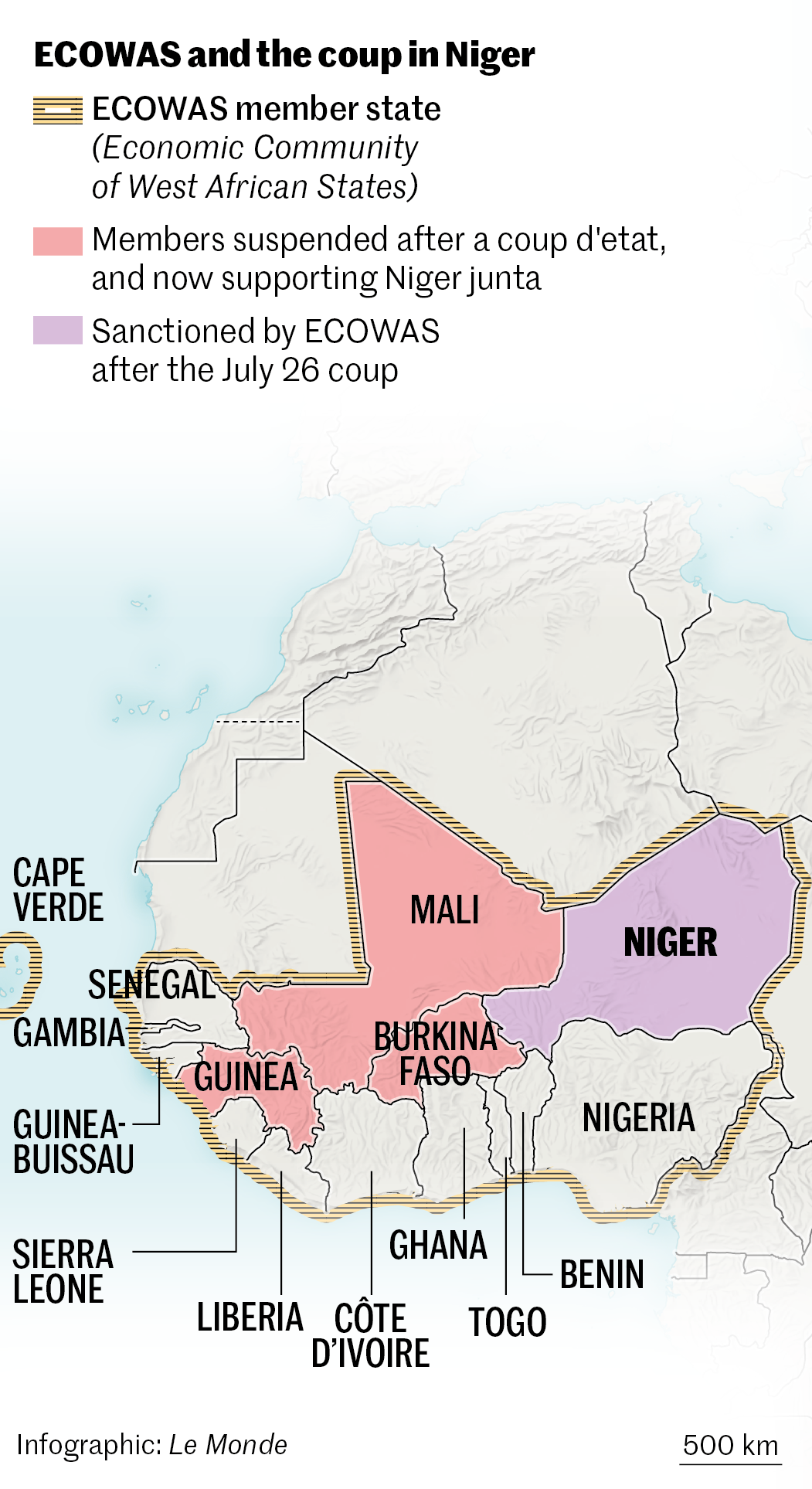


On July 26, the military staged a coup in Niger, ousting the country's elected president, Mohamed Bazoum. 48 hours later, General Abdourahamane Tiani, president of the newly-formed National Council for the Safeguard of the Homeland (CNSP), proclaimed himself head of state. This was the fourth coup in the region, following those in Mali, Burkina Faso and Guinea between 2020 and 2022.
The international community is calling for the restoration of Niger's constitutional order and the release of the overthrown president, who has neither left the country nor resigned. Economic sanctions and condemnations have not made the putschists back down, nor has the threat of force by the Economic Community of West African States (ECOWAS), although this is not unanimously supported.
For now, the Niger junta can count on the support of the military regimes in Ouagadougou and Bamako. Below, Le Monde provides an overview on the situation.
On July 26, putschist soldiers, members of the elite Presidential Guard, overthrew the President of Niger Mohamed Bazoum. The head of state, his companion and son have since been held in the official residence inside the presidential palace.
"This is the result of the continuing deterioration in the security situation and poor economic and social governance," said Colonel Major Amadou Abdramane on behalf of the CNSP on July 27.
On July 28, after two days of uncertainty and negotiations, Tiani, the head of the presidential guard, proclaimed himself head of state. He claims to have been "motivated solely by the desire to preserve" Niger.
According to several Nigerien and foreign sources, Tiani was about to be relieved of his duties by Bazoum. However, Prime Minister Ouhoumoudou Mahamadou denied this, telling Le Monde in an interview that the subject was "not on the agenda" of the Council of Ministers meeting scheduled for July 27, and that "there was no decree to that effect either."
The first step towards a transitional government was taken on Monday August 7, when a prime minister was appointed, Ali Mahamane Lamine Zeine.
Supporters of Bazoum attempted to approach his residence on July 26. They demanded the release of the president, elected with 55.75% of the vote in the second round of the February 2021 presidential election. They were quickly dispersed by the presidential guard, who fired gunshots, causing a stampede. One demonstrator was injured.
The new military authorities also received support at several demonstrations attended by thousands of people on July 30, August 3, the anniversary of the country's independence, and August 6.
During the July 30 march in Niamey, organized by a movement against the French army's Operation Barkhane, demonstrators chanted pro-Russian, anti-French and pro-junta slogans. "Vive Putin," "Vive la Russie," "A bas la France," ("Down with France"), "Vive l'armée nigérienne!" ("Long live the Nigerien Army!"). Demonstrators also targeted the French embassy, denouncing the presence of the former colonial power. The attack prompted Paris to evacuate its nationals. The United States, Spain and Italy soon followed suit.
The Economic Community of West African States (ECOWAS), African Union (AU), European Union (EU), France and the United States condemned the kidnapping of Bazoum, calling for his release and return to power. Russia called for pacifism. An ECOWAS delegation was sent to Niamey to "reason with Tiani and offer him a country of exile," declared Bola Tinubu, President of ECOWAS and Nigeria, on July 26. During the night of August 3-4, the delegation turned back, having been unable to meet either the deposed president or the ruling junta.

Once the event had been clearly established as a coup, France suspended its development aid and budgetary support to Niger on July 29, as it did not recognize the new government. The EU also suspended "all cooperation activities." ECOWAS imposed financial sanctions and gave the putschists a week to restore constitutional order, threatening to "use force" if necessary. In response, the CNSP promised an "immediate response" in the event of aggression.
The military regimes of Burkina Faso, Mali and Guinea, members of ECOWAS, have expressed their disagreement with the organization's decisions. The military rulers of Ouagadougou and Bamako warned that "any military intervention against Niger" would amount to "a declaration of war" against them. They also threatened to leave the economic community and affirmed their support for the Niger junta.
ECOWAS, chaired by Nigeria, had drawn up an outline for a possible military intervention, according to an official of the organization. Senegal was ready to mobilize its army, but several countries were reticent about the idea of intervention. Algeria, which borders Niger but is not a member of ECOWAS, was concerned about the consequences for its territory and the Sahel region. The Nigerian Senate believes that civilians would pay a heavy price, as would northern Nigeria, which shares a 1,500-kilometer border with Niger.
ECOWAS' ultimatum expired on Sunday, August 6. The putschists did not give in to the pressure. "Faced with the threat of intervention," the government closed the airspace, which reopened on August 2 after its initial closure. Its supporters in Mali and Burkina Faso sent a joint delegation to express their "solidarity."
Military intervention would be the last resort for the West African organization, which would prefer a diplomatic solution. The leaders of the West African bloc "would prefer a resolution achieved by diplomatic means, by peaceful means, rather than any other," stated the ECOWAS spokesperson in an initial statement after the ultimatum had expired. However, they added: "No option has been ruled out."
Niger hosts a French military operation as part of its Sahel counter-terrorism policy, an extension of Operation Barkhane, whose withdrawal from Mali was announced after the installation of a Malian military regime.
The evacuation of the 1,500 French soldiers is not planned, and their presence has been denounced by the putschists. Some 1,100 American soldiers are also deployed in the country as part of the fight against jihadism, and German and Italian soldiers are also present. These forces are not engaged in combat or military intervention.
Victoria Nuland, the number-two American diplomat, met the new army chief of staff but was unable to speak with either Tiani or the overthrown president Bazoum. She claims to have proposed solutions for the restoration of democracy but does not seem to have convinced the putschists.
According to Mahamadou, the deposed president's prime minister, the military junta has asked the ECOWAS delegation to return, following its departure after unsuccessful mediation. The mission was due to arrive on Tuesday, the head of government assured French television channel TV5 Monde, but the military regime says it cannot welcome it for security reasons. "The current context of anger and revolt among the population following the sanctions imposed by ECOWAS does not allow us to welcome the delegation with the required calm and security," according to an official communiqué from the Niger Ministry of Foreign Affairs to the ECOWAS representation in Niamey, dated Monday and quoted by Agence France-Presse.
Germany, Italy and the United States have advocated mediation and called for further discussions with the new military government. An emergency ECOWAS session on the situation in Niger is scheduled for Thursday in Abuja, the Nigerian capital. New resolutions could be taken.
Translation of an original article published in French on lemonde.fr; the publisher may only be liable for the French version.
